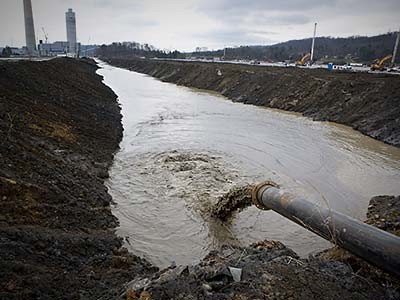Congress adjourned at the end of this week for their annual August vacation, and as usual, they used this last week of July to push their most extreme anti-environment legislation.
One of the main goals of the industry-funded House of Representatives is to loosen coal ash rules before they go into effect in October, and that’s exactly what the House did last week.
The Improving Coal Combustion Residuals Regulation Act was passed last week with only one Republican voting against the Act and 19 Democrats voting in favor. The Act will prevent the EPA from being able to enforce provisions of their recently-announce coal ash safety standards, leaving those decisions instead up to individual states to make (should they choose to even regulate the toxic substance.)
The legislation was sponsored by Republican David McKinley of West Virginia, a coal-funded Congressman who has a long history of trying to ease the regulatory “burden” on coal ash and other industry residuals.
This latest piece of legislation would allow coal ash disposal companies to continue using outdated and dilapidated storage facilities to store the toxic waste, even in instances where they know the coal ash is leaking. According to the language in the legislation, a disposal company would legally be allowed to continue using leaking storage containers for up to eight years after a leak is detected.
As we’ve reported in the past on the dangers of coal ash: Coal ash is known to contain harmful compounds such as arsenic, selenium, lead, cadmium, and mercury. Additionally, studies have shown that coal ash waste is more radioactive than nuclear waste, and has been linked to increases in cancer rates in areas where coal ash waste is stored.
The rules that this legislation is specifically targeting are the first-ever coal ash disposal guidelines put forward by the EPA, which require a pitiful effort from the industry.
The rules that will go into effect in October say that a company must line coal ash disposal ponds so that they don’t leak, and that some of the existing coal ash ponds will need to be cleaned up.
But even those meager requirements are too much for the dirty energy industry, so they have their stooges like David McKinley go to bat for them in Washington.
By loosening the already-lenient rules on coal ash disposal, our industry friendly politicians are opening up the public to an array of toxic exposures that can be life-threatening.
Image credit: EarthJustice.
Subscribe to our newsletter
Stay up to date with DeSmog news and alerts






